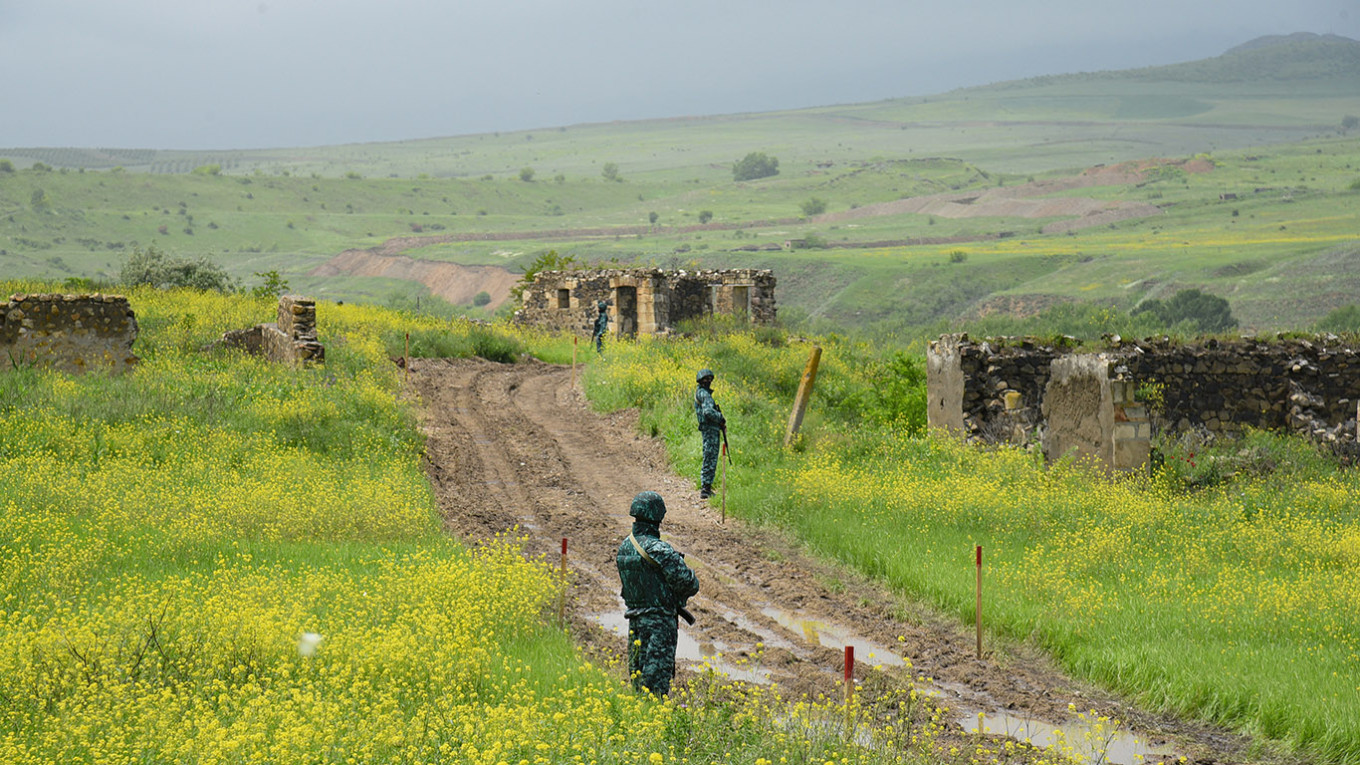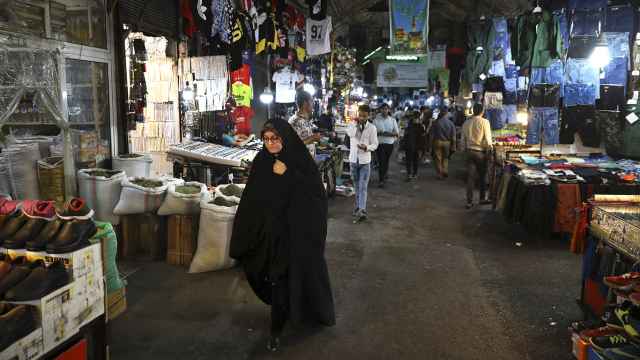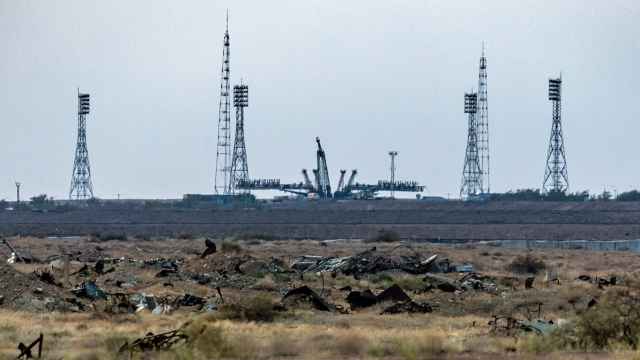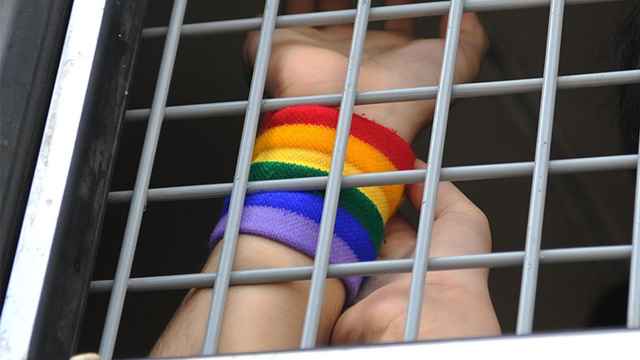YEREVAN, Armenia — In her office in downtown Yerevan, Tatevik Soghoyan slowly goes through piles of documents neatly arranged in chronological order — each one tied to the case of her missing uncle.
The most recent letter from the European Court of Human Rights (ECHR) reads: “The respondent government [Azerbaijan] has been unable to identify Mr. Hrant Papikyan.”
In October 2020, amid the Second Nagorno-Karabakh War, Papikyan, a military doctor, rushed to the battlefield with his driver to treat injured soldiers.
While the driver managed to pull back, Papikyan was surrounded by Azerbaijani forces — and has not been heard from since, Soghoyan told The Moscow Times. Five years later, her family believes he was either forcibly disappeared or taken captive.
Earlier this year, Yerevan and Baku reached an agreement on a long-awaited peace treaty — a potential breakthrough in the decades-long conflict. However, both sides have yet to follow through and officially sign it.
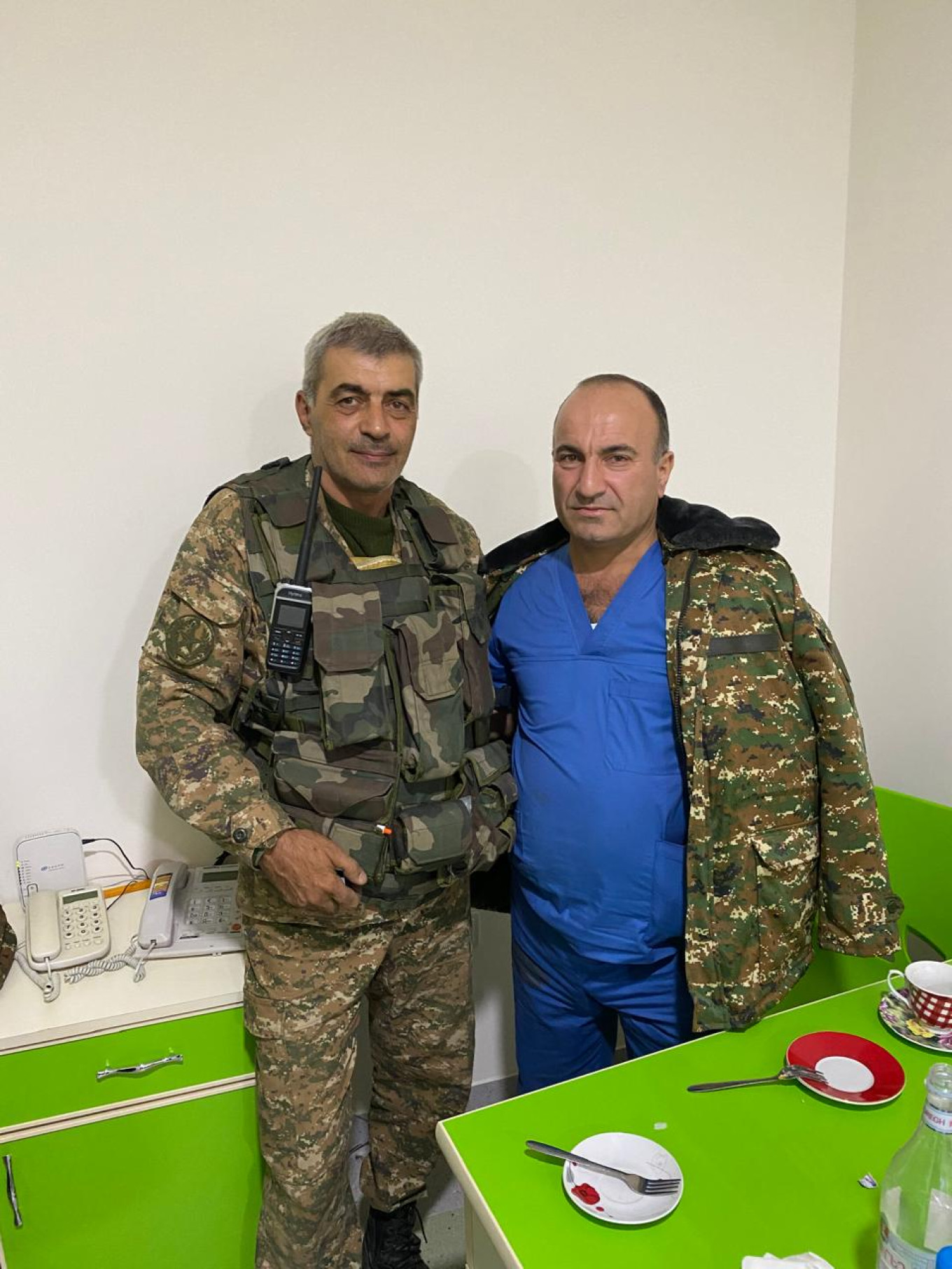
The peace treaty talks came after Baku took full control of the disputed Nagorno-Karabakh region in a lightning offensive in 2023, forcing ethnic Armenians to flee the enclave en masse.
World leaders have voiced support for the agreement, including Russian President Vladimir Putin and U.S. leader Donald Trump — who said he is “looking forward” to seeing the treaty signed, according to Reuters.
At home, however, the Armenian government’s readiness to drop tit-for-tat lawsuits from international courts as part of the deal has sparked turmoil among the families of missing soldiers and more than 100,000 Karabakh refugees. Some have even threatened to sue the government if it goes ahead with the plan.
In mid-March, relatives of missing soldiers gathered in front of the government building to express their disappointment with the decision. Soghoyan was among them.
“It didn’t come as a surprise, but at the same time, there’s anger — we are trying to understand why the government is doing this,” she said.
Last year Armenian Prime Minister Nikol Pashinyan repeatedly hinted at his intention to drop the lawsuits. His top legal envoy, Yeghishe Kirakosyan, appeared not to support the idea and left office just days before the news broke.
“Initially, the government expressed its willingness to file the complaints, but at that time, there was no mention of the possibility of withdrawing them,” Soghoyan explained. “The government cannot make such a decision without asking us. Our rights have been violated, and my family continues to live in uncertainty and suffering.”
Families of the missing have held several closed-door meetings with officials. However, Soghoyan said she still hasn’t received a clear explanation of how she could file an individual case against Baku at the European Court if the government withdraws its complaint.
‘Silent witness to Armenians’ exodus’
Nearly 1,000 Armenians and 4,000 Azerbaijanis are considered missing as a result of the Nagorno-Karabakh wars, according to the International Committee of the Red Cross (ICRC).
The two arch-enemies are now trying to address humanitarian issues stemming from the early 1990s through the only remaining option: interdepartmental commissions.
The most recent meeting between Armenian and Azerbaijani officials took place in February. Last month, Armenian National Security Service Director Armen Abazyan told reporters that another round of talks is expected soon.
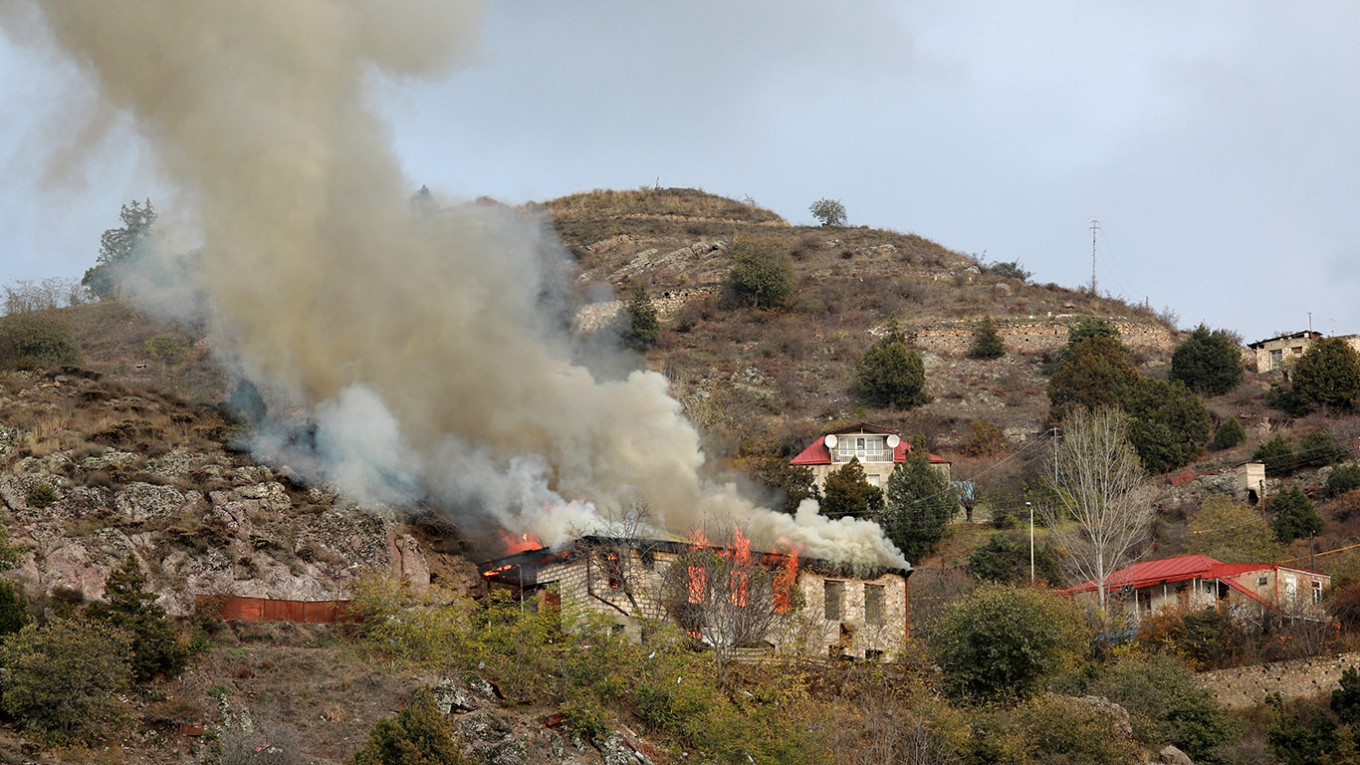
After Russian peacekeepers were deployed to the breakaway enclave, they also aided in humanitarian efforts. Russians received 2,500 requests from Armenians to help search for missing persons. Last year, Colonel General Yevgeny Nikiforov announced that they had facilitated prisoner exchanges, repatriated the bodies of 1,900 fallen soldiers and addressed other humanitarian issues.
However, the Russians left the region last spring — earlier than expected. During the departure ceremony, Nikiforov said that the peacekeepers had fulfilled their duty at a “high level.”
The Armenian government disagrees. In the early days of the Karabakh blockade, which cut residents off from food, medicine and vital services, Pashinyan accused the peacekeeping mission of acting as a “silent witness to Armenians’ exodus.”
Besides the peacekeepers, the Red Cross also had exclusive access to the Karabakh territory and was allowed to make monthly visits to the 23 Armenian prisoners of war held in Baku jails. Last month, Azerbaijani authorities ordered the shutdown of the humanitarian organization’s local office.
“Our organization is in dialogue with the Azerbaijani government. It is a confidential dialogue related to the further organizational part of our work — how it will move forward, in what status, in what form,” Zara Amatuni, the communications and prevention manager for the ICRC’s Armenian office, told The Moscow Times.
‘We will keep fighting’
When Anahit Svaryan first saw the remains of soldiers killed in the 44-Day War — stored in colorful plastic bags at the morgue — she was consumed by a single fear: if her 19-year-old brother was among them, all that might remain of him could be nothing more than shattered bone fragments.
She last heard from her brother, Aram Svaryan, in the fall of 2020, while he was serving his mandatory military duty in Karabakh. Since then, the family has searched for him everywhere.

During the war, Aram and his comrades were ordered to drive to a position near the city of Hadrut to supply food to the army. Five soldiers were in the vehicle, with Aram at the wheel, when they came under heavy fire. The teenager was the first to be struck in the head, and the vehicle overturned, according to a witness. Azerbaijani soldiers later stormed the area. Two of Aram’s comrades survived; the others were identified through DNA tests. No trace of Aram was ever found.
After the war, Anahit’s father Arkadi gave up his work as a stonemason. One of the last straws came when he was asked to carve a tombstone for another fallen soldier.
“For a moment, looking at those families, he yearned for what they had — a place to mourn, something he doesn’t,” Anahit told The Moscow Times.
To keep Aram’s memory alive, the family created a memorial corner for him at home — a tradition that is mainly common among families of fallen soldiers.
“I’ll never forget that moment,” the 24-year-old recalled. “I walked in and saw my father shaping wood into a table while my mother helped — even though she had been against the idea at first.”
Anahit Svaryan and other relatives of missing soldiers have filed claims against Azerbaijan in Europe’s highest human rights court. They fear that the withdrawal of state-level complaints may weaken their individual claims.

“Our lawyer assures us that, no matter the pressure, we will keep fighting,” she said.
Yerevan has filed four cases against Azerbaijan since 2020, and Baku has countered with two complaints. Last November, an additional complaint considered by the UN’s top court was ruled in Armenia’s favor on two of its objections, while a third was rejected. In 2023, the court also ordered Baku to allow Armenians to return to Nagorno-Karabakh.
Gurgen Petrossian, who teaches international law at the University of Erlangen-Nuremberg in Germany, said it is too early to jump to conclusions, but Armenia seems to have a stronger position in the international court than an emboldened Baku.
He also notes that if the claims are withdrawn, both legal and timing complications are likely for families who decide to file cases again.
“In any case, when states withdraw [their claims], doubts arise about the country’s determination and seriousness,” the Armenian scholar told The Moscow Times.
Until these legal disputes are resolved, he believes there’s little chance for lasting peace in the region.
“It is not possible to bring peace without resolving legal issues; peace, as such, does not fall from the sky — legal prerequisites are necessary for this,” Petrossian said.
A Message from The Moscow Times:
Dear readers,
We are facing unprecedented challenges. Russia's Prosecutor General's Office has designated The Moscow Times as an "undesirable" organization, criminalizing our work and putting our staff at risk of prosecution. This follows our earlier unjust labeling as a "foreign agent."
These actions are direct attempts to silence independent journalism in Russia. The authorities claim our work "discredits the decisions of the Russian leadership." We see things differently: we strive to provide accurate, unbiased reporting on Russia.
We, the journalists of The Moscow Times, refuse to be silenced. But to continue our work, we need your help.
Your support, no matter how small, makes a world of difference. If you can, please support us monthly starting from just $2. It's quick to set up, and every contribution makes a significant impact.
By supporting The Moscow Times, you're defending open, independent journalism in the face of repression. Thank you for standing with us.
Remind me later.


